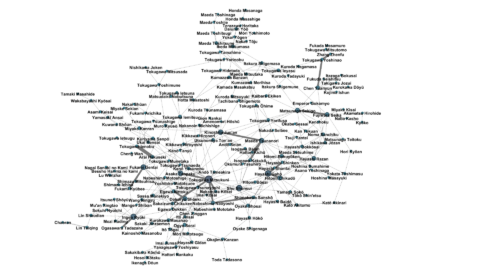
Download
Venue
DIJ Tokyo (access) and online
Registration Info
This is a past event. Registration is no longer possible.
DIJ Mailing List
Please subscribe below to stay informed about our research activities, events & publications:
Patronage and “Confucian Diplomacy”: New Perspectives on Early Modern Scholarship in Kaga Domain between 1650 and 1720
June 28, 2023
Michael Dietrich, Martin-Luther-University Halle-Wittenberg/DIJ Tokyo
The 17th century holds historical significance as the formative period of Japan’s early modern scholarship. Heavily influenced by Confucian or Chinese learning traditions, this era’s academic structures and intellectual patterns paved the way for Japan’s modernisation in the 19th century. The 17th century witnessed the emergence of a new class of dedicated Confucian scholars who quickly gained increasing support from the ruling elite, eventually giving rise to a select group of “learned lords” (kōgaku-daimyō). One such learned lord was Maeda Tsunanori (1643-1724), the fourth ruler of Kaga domain, a prosperous area spanning present-day Ishikawa and Toyama prefectures. Under Tsunanori’s stewardship, Kaga thrived intellectually, gaining recognition for endorsing scholarly pursuits, cultivating a favourable milieu for prospective scholars, and amassing a book collection that rivalled the shogunate’s.
This presentation shed light on two new perspectives regarding Tsunanori’s reign and his engagement with early modern scholarship. Firstly, it examined the standing of primarily Confucian scholars within the Kaga domain, their affiliation with Tsunanori, and his initiatives to support them. To what extent can he be considered a patron of early modern scholarship? Secondly, the role of knowledge and scholarship in Tsunanori’s position within the political system was investigated, along with the extent to which his education and his academic endeavours shaped his interactions with other rulers and prominent figures. While Tsunanori’s (diplomatic) initiatives to strengthen ties with the shogunate through Noh theatre are well-documented, this presentation explored the less charted territory of whether he engaged in what might be termed “Confucian diplomacy”.
Michael Dietrich is a PhD candidate at Martin-Luther-University Halle-Wittenberg. He studied Japanese Studies and History at Halle and Keio University. His research focusses on spaces of knowledge production and the development of academic structures in the context of local rule in early modern Japan. Taking Kaga domain (today’s Ishikawa and Toyama prefectures) as a case study, he is investigating the role of transregional networks of scholars, as well as the role of “learned lords” (kōgaku-daimyō) in the development of a local, pre-modern knowledge society at the end of the 17th century. He has been a PhD Student at the DIJ since September 2022.